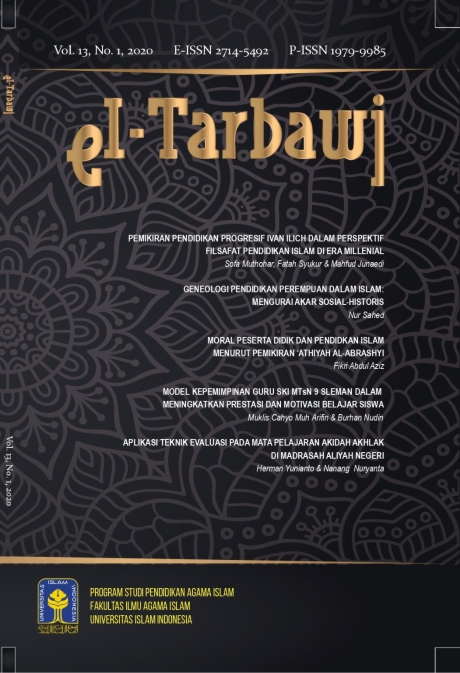Main Article Content
Abstract
This study discusses Ivan Illich’s progressive ideas from the perspective of Islamic Education Philosophy in the millennial era. This study uses a qualitative library research approach and uses content analysis. The results of this study indicate that there are several principles of learning from Ivan Illich that are in line with Islamic Education Philosophy. Firstly, the meaning of learning as knowledge sharing activities is not a school commodity. Secondly, there is equality of learning rights and without discrimination. While the principles that are considered unsuitable include two things. Firstly, the goal of Islamic education is to make people of good morals (akhlaqul karimah), while the learning objective of Ivan Illich is to realize social equality. Secondly, according to Ivan Illich, the concept of a perfect human being is human with full of hope based on effort and negates mercy (epimetheus), whereas, in Islam, a perfect person is a person of noble character (ulul albab). As for the context of the millennial generation, Ivan Illich’s progressive education will be very
useful in supporting an active, creative, dynamic, and confident attitude that will be balanced if it is complemented by the spiritual nature of religiously based education.
Keywords
Article Details
Copyright (c) 2021 EL TARBAWI

This work is licensed under a Creative Commons Attribution-ShareAlike 4.0 International License.
Authors retain copyright and grant the journal right of first publication with the work simultaneously licensed under a Creative Commons Attribution (CC-BY-SA) 4.0 License that allows others to share the work with an acknowledgment of the work’s authorship and initial publication in this journal.
References
- Al Walidah, I. (2018). Tabayyun di Era Generasi Millenial. Jurnal Living Hadis, 2(2), 317–344.
- Illich, I. (1997). Gender. Terj. Matinya Gender. Pustaka Pelajar.
- Illich, I. (2000). Deschooling Society, Terj. Bebaskan Masyarakat Dari Belenggu Sekolah (II). Yayasan Obor Indonesia.
- Illich, I. (2001). Alternative Persekolahan, dalam Paulo Freire,dkk, Menggugat Pendidikan Fundamentalis, Konservative, Liberal, Anarkis. Pustaka Pelajar.
- Illich, I. (2002). Celebration of Awareness: A Call for Instituonal Revolution. Terj. Perayaan Kesadaran: Agama, Pendidikan, Kesejahteraan Sosial. Ikon Tralitera.
- Langgulung, H. (2003). Asas-Asas Pendidikan Islam. PT Pustaka al-Husna Baru.
- Martono, N. (2012). Kekerasan Simbolik di Sekolah, Sebuah Ide Sosiologi Pendidikan Pierre Bourdieu. PT. Raja Grafindo Persada.
- Muhaimin, M. dkk. (2004). Paradigma Pendidikan Islam, Upaya Mengefektifkan Pendidikan Agama Islam di Sekolah. PT. Remaja Rosdakkarya.
- Nata, A. (2018). Pendidikan Islam di Era Milenial. Conciencia, 18(1), 10–28.
- Rouse, M. (t.t.). What is Millennials (Generation Y)? - Definition from WhatIs.com. WhatIs.Com. Diambil 9 Agustus 2019, dari https://whatis.techtarget.com/definition/millennials-millennial-generation
- Supriyadi. (2016). Community of Practitioners: Solusi Alternatif Berbagi Pengetahuan antar Pustakawan. Lentera Pustaka, 2 (2), 83-93.
- Tafsir, A. (1994). Ilmu Pendidikan dalam Perspektif Islam (2 ed.). PT. Remaja Rosdakkarya.
References
Al Walidah, I. (2018). Tabayyun di Era Generasi Millenial. Jurnal Living Hadis, 2(2), 317–344.
Illich, I. (1997). Gender. Terj. Matinya Gender. Pustaka Pelajar.
Illich, I. (2000). Deschooling Society, Terj. Bebaskan Masyarakat Dari Belenggu Sekolah (II). Yayasan Obor Indonesia.
Illich, I. (2001). Alternative Persekolahan, dalam Paulo Freire,dkk, Menggugat Pendidikan Fundamentalis, Konservative, Liberal, Anarkis. Pustaka Pelajar.
Illich, I. (2002). Celebration of Awareness: A Call for Instituonal Revolution. Terj. Perayaan Kesadaran: Agama, Pendidikan, Kesejahteraan Sosial. Ikon Tralitera.
Langgulung, H. (2003). Asas-Asas Pendidikan Islam. PT Pustaka al-Husna Baru.
Martono, N. (2012). Kekerasan Simbolik di Sekolah, Sebuah Ide Sosiologi Pendidikan Pierre Bourdieu. PT. Raja Grafindo Persada.
Muhaimin, M. dkk. (2004). Paradigma Pendidikan Islam, Upaya Mengefektifkan Pendidikan Agama Islam di Sekolah. PT. Remaja Rosdakkarya.
Nata, A. (2018). Pendidikan Islam di Era Milenial. Conciencia, 18(1), 10–28.
Rouse, M. (t.t.). What is Millennials (Generation Y)? - Definition from WhatIs.com. WhatIs.Com. Diambil 9 Agustus 2019, dari https://whatis.techtarget.com/definition/millennials-millennial-generation
Supriyadi. (2016). Community of Practitioners: Solusi Alternatif Berbagi Pengetahuan antar Pustakawan. Lentera Pustaka, 2 (2), 83-93.
Tafsir, A. (1994). Ilmu Pendidikan dalam Perspektif Islam (2 ed.). PT. Remaja Rosdakkarya.
